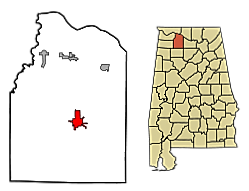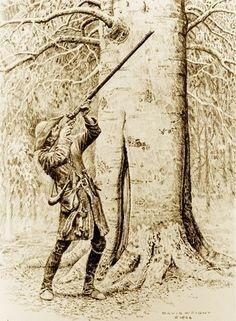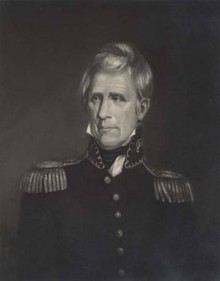Anne Royall (June 11, 1769 – October 1, 1854) was a traveler and writer and was one of the first newspaperwomen. She married Captain William Royall, a gentleman farmer who served in the American Revolution. When he died in 1813, she was left penniless after a brutal court battle with her dead husband’s relatives, Anne traveled Alabama for the next four years. She wrote letters to her friends about the evolution of the young state. The letters were published as a book entitled Letters from Alabama in 1830. This story reveals the trials faced by early settlers in Alabama
Moulton, March 10th, 1819.
Dear Matt,
Since the weather became mild, I frequently ride out through this beautiful country, and find no little to admire and amuse. This town is in the centre of Lawrence county, and it is supposed will be the county seat of justice. It is 20 miles south of the Bluff, in a most enchanting situation. Several very respectable families live here; the town is handsomely laid off, and the country around it is as rich as heart can wish. I have formed an acquaintance here with an elderly Tennesseean, the incidents of whose life is a complete novel.

Map of Moulton in Lawrence Co., Alabama
First white man in permanent settlement
His father was the first white man that made a permanent settlement on the waters of the Holston, now in the bounds of Tennessee. He settled on the Wataga, a creek that empties into the Holston. His name was Burlison, a native of New Jersey, and moved from thence to North Carolina, and finally to Wataga.
He was allured, in the first place by the prospect of game, and, in the second place, by good land, and was soon followed by others; and by their united efforts successfully disputed the hunting grounds with the Indians. The timid deer, assailed on all sides by deadly foes, fled before the white man for shelter amongst the Indians. The adventurous white man pursued the game, but in doing so, he was fiercely opposed by the Indians, who disputed every inch of ground with him, at the mouths of their rifles, until they were fairly compelled to yield. Thus was Tennessee settled. This settlement was made about the year 1774 or 1775.
Almost constantly with arms in his hands
Mr. Burlison was so young at this time, that he recollects nothing of the enterprize. He lost his father at twelve years of age, and from that day, to the end of the Creek war, he has been almost constantly with arms in his hands!—He is a stout man, about 50 years of age—is honest, affable, and generous as a prince; has experienced every vicissitude of fortune, and endured every species of suffering! Peace and war, sickness and health, poverty and plenty, has at different times been his lot.—He is at this time possessed of an independent fortune, and yet this man, with the manners of a courtier, cannot write his own name! though he reads very well.
Forced to keep her mare in the house
This gentleman, for such he is, losing his father at the early age he did, with eight more children, the widow had to struggle with the Indians on one side, and the tories on the other. Most of the children were boys, and their father left property sufficient to educate them, and left strict injunctions to that amount; but the revolutionary war coming on, the widow, between the tories and the Indians, was stripped of every thing she had, excepting a valuable brood mare! In order to save this last of her property, she was forced to keep it in the house where she slept every night!
But those lawless ruffians, the tories, gaining intelligence of the fact, proceeded to the house, and forcing the door, took her off. This was the last thing she had. Her situation was now at the highest pitch of human misery. Without a friend, without provision; the Indians in alliance with the British, killing all that fell in their way, she dared not flee in that direction.
The tories, burning and murdering all before them, on the other side, it was but death, and she resolved to meet it in the woods where she was! Meantime her oldest son, not 14, and Joseph, (of whom I learned the story,) about 12 years old, would sally forth with gun on shoulder, sometimes alone, but often with others of their own age, to watch the motions of the Indians; and whenever they saw them approach, would hasten to apprize their parents.
Afraid to shoot game for the noise
These little heroes would pass whole days in the woods, at all seasons, almost naked, and without tasting food; for though they saw plenty of game, they were afraid to shoot lest the report of the gun might betray them to the Indians. The two oldest brothers would sometimes take their next eldest brother with them. On this occasion they would wander farther into the forest than usual, and once became so bewildered they lost their course, and wandered about till they were quite spent with fatigue and hunger.
The youngest was carrying one of his brother’s guns, having none of his own, and seeing a deer jump before him, he levelled the piece at the deer, and killed it; saying, “Indians, or no Indians, he would have something to eat—he might as well die one way as another.” The eldest one being alarmed, forced him away, and they concealed themselves in the brushwood to await the result, concluding the Indians, if within hearing, would soon appear.

Wolf marched up to it
As they lay concealed, the little one who had done the mischief, would often rise up to take a peep at his meat. At length he saw a wolf marching up to it, and pointing it out to his brothers, they bid him be still; but finding he could not be restrained, they all ran together and frightened off the wolf. They then skinned the deer, and kindling a fire, broiled a part of it and swallowed it hastily; and taking what they could carry, once more sought their way home, entirely ignorant of the course.
SEE ALL BOOKS BY DONNA R CAUSEY
At length night overtook them, and, losing heart, they threw away their venison, and still wandered on, without seeing a human face, and without knowing whither they were going. Late in the night they were overtaken by a hunter, who conducted them home to the no small joy of their mother, who concluded they were killed by the Indians. She had been running through the forest, from the time it grew dark, in a state of distraction. Thus Mr. Burlison, and his brothers, spent nine years, guarding the settlements in this perilous manner, suffering every species of misery. He was three years of the time without shoes, and no sort of clothing, but a shirt made of buckskin!
Settlement advanced by degrees
He states that he had become so inured to cold, hunger, danger, and fatigue, that he was a stranger to their opposites. Meantime their settlement advanced by degrees. Those who survived the fire and sword of the British and the tories, sought their brothers in the wilderness. Their highborn souls fired by their wrongs, glowing with resentment, and inspired by the example of their companions in the wilderness, took courage from despair. Having nothing left but their lives, and disdaining alike British gold and British chains, united with their friends for the common safety.
Thus they nurtured a germ, which, in time, hurled destruction on their proud oppressors. Many of these lived to overwhelm their imperious foe with a complete vengeance. Little did the impolitic Briton think those outcasts, those little victims of his wanton barbarity, would ever dare to face him, much less that he would teach him such a lesson in the art of war, as he never learned before.
Never submit to the British yoke
If it be asked in time to come, how so potent an army of vetrans came to be slaughtered by an inferior force, it may be answered, these were the men, and the sons of those men, who, thirty-three years back, nobly resolved never to submit to the British yoke. These were the highminded few, who, in the tender years of childhood, indignant at their wrongs, rushed into the woods, destitute of every comfort; but in their youthful breasts they carried a spark which they cherished at the hazard of their lives; this spark it was, that, bursting into a flame, at New Orleans, laid their daring foe at their feet!— The astonished Britons will long remember, too, that it was his ill judged policy, and inhuman cruelty, that paved the way to it.
Indians passed within a few steps of him
Mr. Burlison related many anecdotes of those enterprising men. As they increased in numbers, they extended their settlements, always keeping a party of choice spirits watching the enemy—of these he was one. In one of their excursions they discovered the fertile plains on Cumberland river; now West Tennessee. In one of those exploring expeditions he made two narrow escapes. Coming suddenly upon the Indians one day, he instantly threw himself flat on the ground, in some brush wood, and the Indians passed within a few steps of him.
At another time, he and his companions came near perishing with cold. They had travelled several days in a succession of snow and rain; one night, however, when they went to strike their camp, they found their powder wet, and they had to remain in their wet clothes all night, wet to the skin, the snow deep, and the night cold and freezing. Thus was Tennessee settled; and by such men.
It has been said that Tennessee was an asylum for outlaws and horse thieves. That Tennessee should be exempt from an evil, common to the settling of all our States, I should be happy to know. I would recommend to horse thieves in particular to choose some other asylum in future, as there is not a state in the Union in which they receive less hospitality.
Yours, &c.





Not a bad read if you have a min. or two